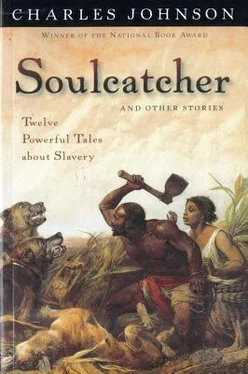Oboto touched Malawi's arm just before they were pushed into the warehouse, and Malawi saw — away in the distance beneath a day-old moon — a vessel a hundred times the size of the thatch-roofed homes in his village, with sails like white bird wings and great, skeletal trees springing from its deck and piercing the clouds. This he heard the phantoms call the Providence. Then it was dark as they were shoved into the warehouses. Families in his coffle were separated — husbands from wives; children from their parents — so those in their cells, then later on the ship, could not talk to each other. By some miracle, one he thanked his ancestors for, they'd blundered and not separated him from his brother, who had seen twenty harvests, five more than Malawi himself.
That night their jailers fed them a porridge made from roots and grainy honey beer. As they ate, Oboto told him, "Don't be afraid, little brother."
Malawi was indeed afraid but did not want to anger Oboto. "I'm not, as long as you are here—"
"No" — his brother cut him off —"listen to me. Even if I am not here, you must not be afraid. Malawi, I have been watching these people who raided our village, and the ones from the ship… They are not strong."
"But they have many guns," said Malawi, "and chains and great ships!"
"And they bleed when they are cut." Oboto moved closer to him as a guard passed their cell. He whispered, "I've seen them faint in the sun, and I watched one from that ship cry when he passed water, as if he was afflicted and doing so was painful. Did you see some of them up close? Their rotten teeth, I mean. A few are missing fingers. Or a hand. They touch others in places forbidden, and all the while they look afraid, fingering their rifles, looking over their shoulders. Their mothers have not yet finished with them. They are barbarians. Malawi, I don't think the spirits respect them. How could they? They smell bad. They are unclean. They are dead here" — he touched his chest above his heart—"not us. Some of the white men I saw, the ones with the whips, grovel before others in fear and have stripes on their backs as if they were slaves. The ones doing the hardest work, unloading crates from the ship for trade, don't understand as many tongues as you or I."
" Yes… " Malawi nodded slowly, for his brother spoke well, as always. "I saw that." As a merchant's son, he'd picked up enough Ibo and Bantu to converse passably well when he accompanied Mbwela on trips to buy and sell goods. And he'd seen one of the phantoms, a young man close to his brother's age, fall down in the heat when unloading a crate of goods from the Providence, and because he was slow in rising, one of the other ghosts beat him, bloodying his mouth. He'd seemed different from the other devils. His nose was hooked like that of a hornbill beneath blue eyes that could have been splinters from the sky. This was probably his first trip to Africa and it seemed no one had told him that it was a good idea to take fluids all day, even a little, because your body was constantly losing moisture, whether you were perspiring or not. "But," said Malawi, "I am afraid of them. I'm sorry…"
"Don't be sorry." Oboto touched Malawi's arm gently. "I was afraid too when I saw them burning the village. When our parents died. And I prayed to our ancestors to let me die — yes, I did that during the journey here — but they helped me understand."
"What?" said Malawi. "Why they have taken so much from us?"
"No, they showed me what they cannot take. And I will show you."
Malawi knew — as their captors could not — that before the raid on their village Oboto was destined to be a griot, a living book who carried within himself, like a treasure, his people's entire history from time immemorial. Its recitation took three full days. When he was a child all the adults agreed that Oboto's gift of recall distinguished him for this duty, and from his fifth harvest he could be seen trailing behind gruff, old Ndembe, who was griot then but getting a bit forgetful in his sixties, repeating after his teacher every chapter of their tribe's history. He learned their songs for war and weddings, the words they sang when someone died or was born. He learned the chronicle of their kings and commoners, the exploits of their heroes, folklore, and words for every beast, plant, and bird as well as the rhymes their women sang when they made fufu , taking into himself one piece of their culture at a time, then stitching it into an ever-expanding tapestry that covered centuries of his people's hopes and dreams, tragedies and victories. Now Malawi realized their village had not been wiped from the face of the world; its remains were kept inside Oboto. And during that night in the warehouse, while the other prisoners wailed or wept, Oboto began to teach his younger brother, transmitting all he knew, beginning with the story of how their gods created the world, and then the first man and woman.
Oboto continued after he and Malawi were bathed, branded, and brought on board the Providence. During the night they were kept below, tightly packed together, and forced to lie on their right sides to lessen the pressure on their hearts. Those on the ship's right side faced forward; those on the left faced the stern. Hatches and bulkheads had been grated and apertures cut around the deck to improve the circulation of air, though in those depths Malawi wheezed when he whispered back the ancient words his brother chanted.
Come morning, they were forced topside. The phantoms covered their mouths with rags, went into the hold to drag from below those prisoners who'd died during the night, and then by 9 A.M. cleaned this unholy space with chloride lime so it could be inspected by the ship's captain. Up above, more phantoms washed and scrubbed the decks and splashed buckets of salt water on Malawi and the others, then from buckets fed them a pasty gruel the color of river mud in messes of ten. And all the while, Oboto quietly sang to his brother — in a language their captors could not understand — how their people long ago had navigated these very waters to what the phantoms called the New World, leaving their hieroglyphics and a calendar among the Olmecs, and a thousand years earlier ventured east, sprinkling their seed among the Dravidians before their cities were destroyed by Aryans who brought the Vedas and caste system to enslave them. On and on, like a tapestry, Oboto unfurled their past, rituals, and laws in songs and riddles as they ate or when the phantoms shaved their hair and clipped their nails every few days.
Slowly, after weeks of suffering, it dawned on Malawi that this transmission from his brother, upon which he fastened his mind night and day like a prayer, was holding madness at bay. It left him no time to dwell on his despair. Each day the prisoners were brought together for exercise. To dance and sing African melodies beneath mist-blurred masts and rigging that favored the webwork of a spider. Week after week, Oboto used that precious time to teach, at pains to pass along as much of their people's experiences as his younger brother could absorb, though after six weeks Malawi saw he was weakening. His voice grew fainter, so frail that at night when they lay crushed together, Malawi had to place his ear close to Oboto's lips, catching the whispered words as his brother's chest rose and (ell, each of his weak exhalations a gift from a world they would never see again.
When Oboto's wind was gone, Malawi held him close and chanted his brother's spirit safely on its journey to join their ancestors and he kept the rats away. The hatch creaked open. Sunlight spilled into the hold, stinging his eyes. The phantoms came below cursing — they were always cursing — and drove the prisoners onto the deck. One of them, the hook-nosed phantom, began unchaining Malawi from Oboto. "I guess he was some kind of kin to you, wasn't he? That's too bad. I've lost family too, so I guess I know how you feel." He removed the last of the shackles from Oboto, then stood back, waiting for Malawi to release his brother. "Go on now, you can turn him loose. He's dead."
Читать дальше












